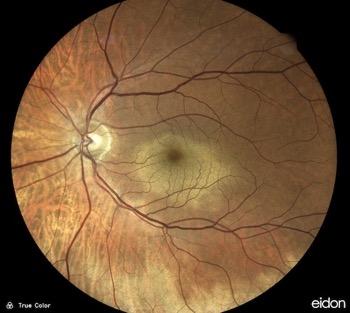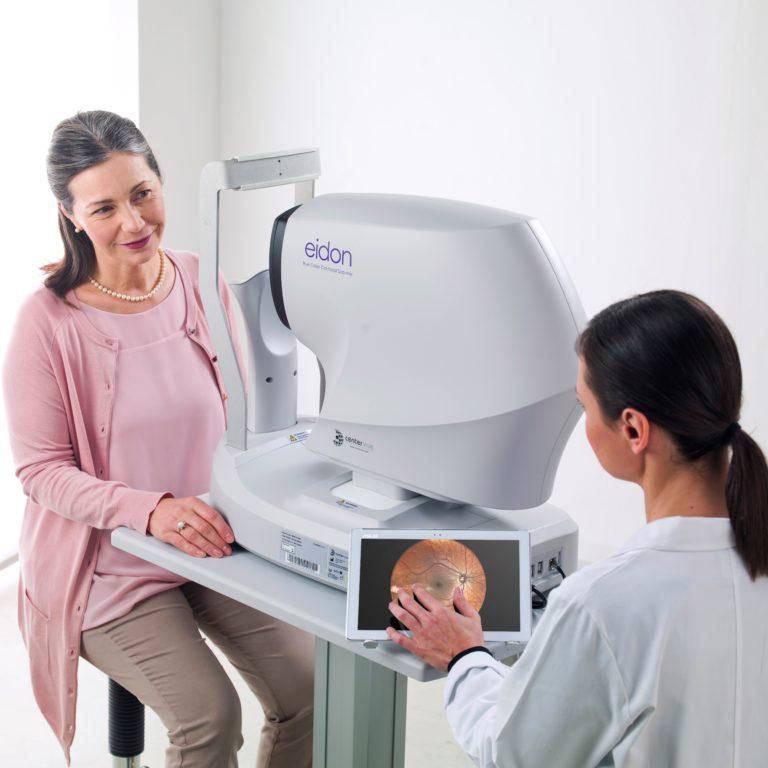We are very excited to announce that Mitchell Family Eye Care is now offering retinal photography for every patient at their annual exam! This new technology allows our doctors to more effectively examine your ocular health, monitor for changes, and present your findings in the format of a digital image.
What is a retinal photograph? 
First things first. You may be wondering what the retina is and why it is important to photograph it. Your retina is the light-sensitive tissue that lines the inside of your eye. It is responsible for converting light into electrical signals which are then passed to your brain. As you can imagine, it is imperative to make sure your retina is healthy at every exam in order to maintain lifelong vision.
Why do we need to photograph the retina?
Now that we know why the retina is so important, let’s discuss the value of a retinal image. Microscopic changes can occur in the retina with no noticeable symptoms, and the only way for our doctors catch early signs of retinal disease is by careful examination and notation. While they used to have to rely only on written interpretations of their findings, our EIDON Widefield retinal camera enables them to store images and compare them side by side each year!
What are you looking for on my retinal photograph?
Our doctors will be looking for any early signs of retinal disease such as pigmentary changes, areas of retinal thinning, holes, tears, scars or bleeds. They are also able to detect some findings related to diabetes, high blood pressure, and even cancer. These images also show your optic nerve and macula (the area responsible for the central part of your vision) to monitor for any early signs of glaucoma, macular degeneration, and more.
Ideally, your images will not show much change over the years, so there may not be much to discuss. However, if any abnormalities are found, our doctors will be able to show you your imaging so you will be able to see exactly what they see!
Do I still have to be dilated?
Dilation drops have been the standard of care for many years, and our doctors still recommend having it performed at least every 2 years. A dilated eye exam allows a closer, wider 3D view of the retinal structures that is not provided by retinal imaging.
Dilation drops take 15-20 minutes to relax the muscle that controls your pupil size. Once relaxed enough, our doctors are then able to examine your retinal health by using a special lens while having you look in various directions. These dilation drops last for about 4 hours and most often cause only mild light sensitivity and difficulty focusing at near.
On the other hand, retinal photographs give a snapshot of the entire retina in one view and it only takes a few minutes to complete. It does not require dilation drops, making the experience more efficient and comfortable for the patient.
*Please note that our doctors may still need to use dilation drops even after retinal imaging is performed. For instance, it may be necessary to obtain a better view of an area of concern or for confirming an accurate prescription in children or non-verbal patients.
What if the doctor finds something concerning on my retinal photograph?
Rest assured that any abnormalities found in your retinal images will be discussed with you. Some conditions may simply require close monitoring or additional testing while more serious conditions may require blood work or referral to a retinal specialist.
The most important thing is to not allow your anxieties over abnormal findings stop you from having your eyes examined annually. It is imperative to discover these findings as soon as possible so that our doctors can offer proper guidance on how to prevent your condition from worsening. Many retinal conditions do not cause any noticeable symptoms until they are at the advanced stage and at that point the damage cannot be reversed. That is why it is important to have your retinal fully examined annually to detect any concerns before they cause permanent damage.
Our doctors are excited to see you and share this new technology with you! Give us a call today to schedule an appointment so we can help make sure your eyes stay as healthy as you deserve them to be!

